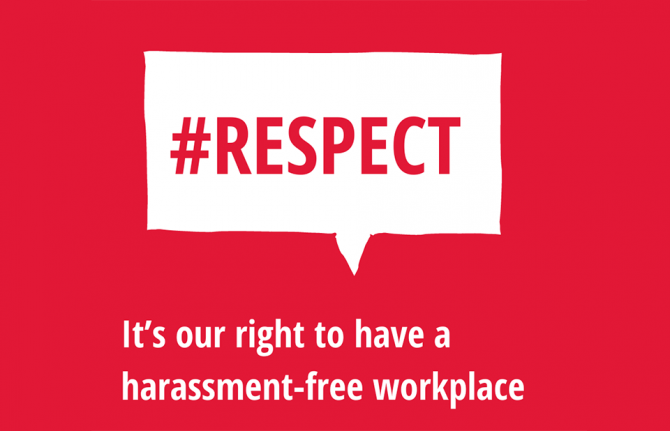

Feature Story
UNAIDS Respect campaign against abusive conduct
16 November 2021
16 November 2021 16 November 2021Launched by the UNAIDS Executive Director, Winnie Byanyima, in mid-September, the Respect campaign is raising awareness among UNAIDS staff of the UNAIDS/World Health Organization Policy on Preventing and Addressing Abusive Conduct, updated in early 2021.
“It is our right to work in a respectful environment, a right that each and every one of us is entitled to, as well as obligated to uphold. Together, we will make our workplace equal, safe and empowering,” wrote Ms Byanyima in a message to all staff.
The policy expanded the scope of protection to include interns and consultants and now describes, with examples, types of abusive conduct. The new policy also removed the requirement for complaints to be made within a specific time limit.
“A few colleagues came up to me to share their own stories and situations when they didn’t feel valued. They were appreciative that we are naming these issues. This is a way to show our support and explain avenues to address these situations to those who had to endure them. It also increases the stakes for those who act in this way because they know that all of us know this is not acceptable,” said Mumtaz Mia, who leads the culture transformation process at UNAIDS.
The campaign aims at improving knowledge and understanding of what is considered abusive conduct by using everyday examples and is based on six different experiences representative of abusive conduct, from discrimination, to abuse of authority, to sexual harassment and homophobia.
“Every staff member and consultant at UNAIDS is entitled to and has the right to expect a safe and respectful workplace. This is an obligation that each one of us, from the Executive Director to our ancillary staff, has to our workmates. Our staff surveys have told us that hasn’t always been the experience for everyone working in the organization and so the Respect campaign is a much-needed and positive development which the Staff Association hopes will contribute to building a better and healthier UNAIDS workplace for each and every one of us,” said Stuart Watson, Chair of the UNAIDS Secretariat Staff Association.
As part of the campaign, conversations on abusive conduct are taking place within UNAIDS teams, with staff invited to learn more about abusive conduct. Looking to the future, the campaign will continue, building on the current campaign and reflecting the lived experiences of staff across the organization.
The recent UNAIDS Global Staff Survey revealed that 55% of respondents feel that UNAIDS takes allegations of discrimination, abuse of authority, ill treatment and sexual harassment seriously. Half of the respondents also said that they feel comfortable to speak up and address colleagues about incivility or exclusionary behaviour they experience or observe. While these are above benchmark figures, UNAIDS’ management will keep monitoring the situation. The aim is to narrow the gap between experienced abusive conduct and reporting and action against the conduct, as well as the overall reduction of abusive conduct for a safe, equal and empowered UNAIDS for everyone.



